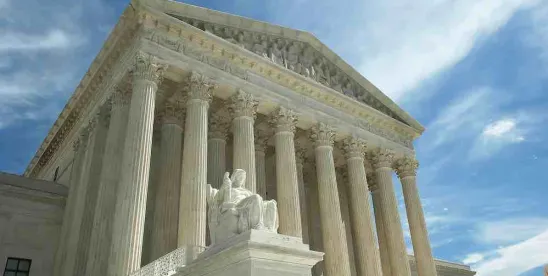On what was the next-to-last day of the term, a 6-3 Supreme Court delivered a very lengthy opinion written by the Chief Justice, overruling 40 years of jurisprudence embodied in the Chevron doctrine that had been the bedrock of administrative law.
In Loper Bright Enterprises v. Raimondo (which also governs Relentless, Inc. v. Department of Commerce), the Court held that “the Administrative Procedure Act [APA] requires courts to exercise their independent judgment in deciding whether an agency has acted within its statutory authority, and courts may not defer to an agency interpretation of the law simply because a statute is ambiguous; Accordingly, Chevron U. S. A. Inc. v. Natural Resources Defense Council, Inc., 467 U. S. 837 (1984) is overruled.”
Holding that Chevron deference cannot be squared with the APA, the Chief Justice traces the departure from the traditional role of the judiciary in making independent determinations of statutory meaning. Here, the question was “whether an Environmental Protection Agency (EPA) regulation was consistent with the term ‘stationary source’ as used in the Clean Air Act. In answering the question, the courts below followed Chevron’s familiar two-step approach, first discerning “whether Congress ha[d] directly spoken to the precise question at issue.” If congressional intent is clear, that ends things, but where “the statute [was] silent or ambiguous with respect to the specific issue” under consideration, the court was required to defer to the agency if it had offered “a permissible construction of the statute.”
Noting that neither Chevron nor its progeny attempted to reconcile the case’s framework with the APA, the Chief Justice opined that Chevron defies the command of the APA that “the reviewing court”—not the agency whose action it reviews—is to “decide all relevant questions of law” and “interpret . . . statutory provisions.” Instead, it requires a court to ignore, not follow, “the reading it would have reached if it had exercised its independent judgment as required by the APA. In short, there is no basis to conclude that statutory ambiguities are implicit delegations to agencies.” Moreover, Chevron is “misguided because agencies have no special competence in resolving statutory ambiguities. Courts do.”
In dissent, Justice Kagan, along with Justices Sotomayor and Jackson, disagreed. According to Kagan:
[Where] Congress has left an ambiguity or gap, then a choice must be made. Who should give content to a statute when Congress’s instructions have run out? Should it be a court? Or should it be the agency Congress has charged with administering the statute? The answer Chevron gives is that it should usually be the agency, within the bounds of reasonableness. That rule has formed the backdrop against which Congress, courts, and agencies—as well as regulated parties and the public—all have operated for decades. It has been applied in thousands of judicial decisions.
. . .
And the rule is right. This Court has long understood Chevron deference to reflect what Congress would want, and so to be rooted in a presumption of legislative intent. Congress knows that it does not—in fact cannot—write perfectly complete regulatory statutes.
Well, Congress is now on notice. To paraphrase Taylor Swift’s popular lyric, it can no longer leave blank spaces for unelected agencies to fill. But note that while the categorical rejection of Chevron—as inconsistent with the responsibility of courts defined in the APA—went farther than most analysts expected, the Chief Justice nevertheless made it clear that agency views still will be treated with respect. Also, in gauging the potential effect of the case, one is mindful of the reminder, in Justice Gorsuch’s concurrence, that the Supreme Court hasn’t decided a case on the basis of Chevron since 2016. Today’s decision in Loper certainly will encourage those challenging agency actions, particularly at agencies that regulate broadly over many complex areas of delivery of health care services, technology, research, reimbursement, etc.
While executive branch departments and administrative agencies no longer will be afforded deference based only on their interpretation of ambiguous statutory language, they are still likely to get some (as yet to be determined) degree of respect from courts that are analyzing findings of fact or policy in the challenged regulatory activities—as the courts consider whether those actions are arbitrary or capricious under the APA. The case is a big deal but consistent with the recent trend in the Supreme Court to emphasize delegation and textual literalism. Whether one considers the power of administrative courts or agency interpretations of their jurisdiction, it is clear that the conservative majority of the Supreme Court is taking a hard line on the separation of powers and narrowing the exercise of power by the administrative state.
Grants Pass v. Johnson is another 6–3 conservative/liberal split decision. The municipal code of Grants Pass, Oregon, prohibits camping (in this case, sleeping) on public property or parking overnight in the city’s parks. This misdemeanor statute provides for initial fines, but, for multiple violators, imprisonment might result. The respondents here filed a class action complaint on behalf of homeless people living in Grants Pass, claiming that the city’s ordinances against public camping violated the Eighth Amendment’s prohibition of cruel and unusual punishment. Justice Gorsuch wrote the opinion for the Court, holding that the enforcement of generally applicable laws regulating camping on public property is not barred by the Eighth Amendment.
Ignoring the social situation and impact surrounding enforcement of the ordinance, Justice Gorsuch concludes, “The Cruel and Unusual Punishments Clause focuses on the question what ‘method or kind of punishment’ a government may impose after a criminal conviction, not on the question whether a government may criminalize particular behavior in the first place.” The fines and 30-day imprisonment penalties that Grants Pass imposes do not qualify as cruel and unusual because they are not designed to inflict “terror, pain, or disgrace.” Nor are their similarly limited fines and jail terms unusual regimes for this type of behavior.
Justice Gorsuch distinguishes the instant case from Robinson v. California, 370 U.S. 660 (1962), in which the court held that states could not criminalize the status of narcotic addiction because that case “expressly recognized the ‘broad power’ States enjoy over the substance of their criminal laws.” While Justice Thomas, concurring, contends that Robinson itself was wrongly decided, Justice Sotomayor, for the dissenters, writes that the Court is indeed authorizing the punishment of the homeless based upon their involuntary status.
Fischer v. United States will surprise some observers, who will find it anomalous that liberal Justice Jackson joined with the conservative majority while conservative Justice Barrett joined with the two remaining liberals in dissent. As for me, I regret that the Court did not accept the view of the amici group, of which I was a member.
The case concerns the January 6, 2021, riot at the U.S. Capitol. Fischer was convicted of violating a provision of the Sarbanes-Oxley Act that imposes criminal liability on anyone who corruptly “alters, destroys, mutilates, or conceals a record, document, or other object, or attempts to do so, with the intent to impair the object’s integrity or availability for use in an official proceeding.” 18 U. S. C. §1512(c)(1). The next subsection, (c)(2), extends that prohibition to anyone who “otherwise obstructs, influences, or impedes any official proceeding, or attempts to do so.” The Court’s majority, per the Chief Justice, applies a rigid textual analysis that leads it to conclude that the “otherwise” clause limits proof of the offense that requires the defendant to “have taken some action with respect to a document, record, or other object.” The defendant, who engaged in a variety of riotous acts, didn’t “impair the availability or integrity of records, documents, objects, or other things used in an official proceeding.” Considering both surrounding words and overall context, the Court’s majority engages in a lengthy and detailed textual and grammatical analysis, concluding that Fischer’s conduct, which wasn’t literally any of the acts stated, nor consistent with similar acts closely enough to be synonymous with them, failed to satisfy the definition of “otherwise.”
Justice Barrett, applying similar textual analytics and a good deal of common sense, opines otherwise regarding “otherwise.”
This decision would appear to absolve a number of convicted January 6 rioters. The U.S. District Court for the District of Columbia will likely soon experience a flood of motions. Prosecutors also will have to be able to demonstrate more specific acts to justify future convictions.




 />i
/>i
